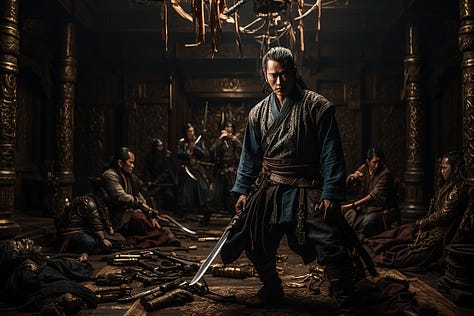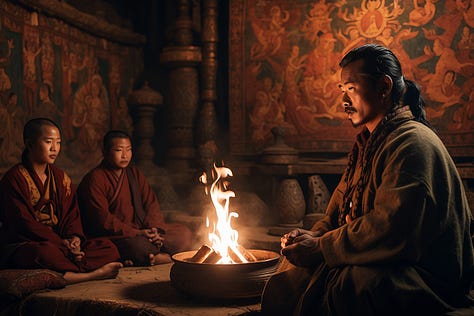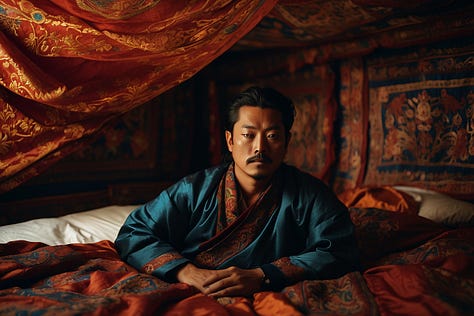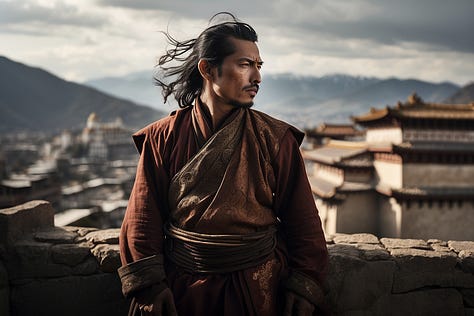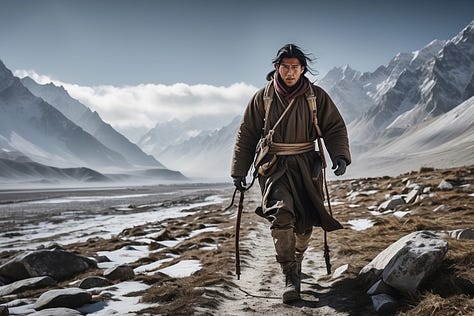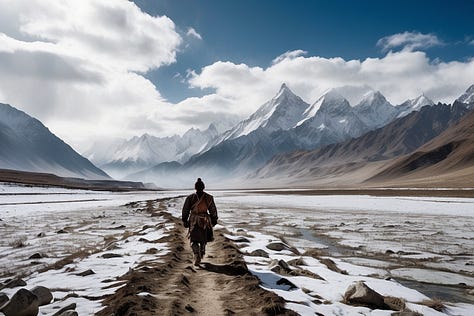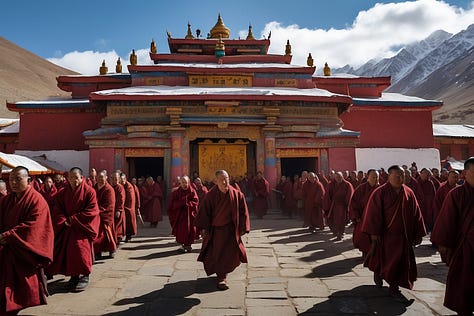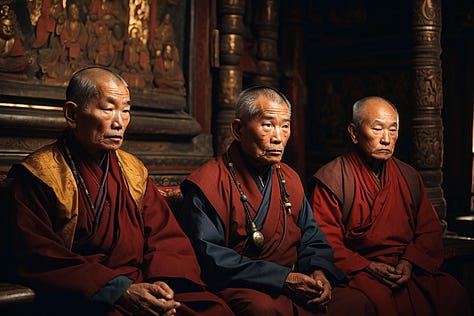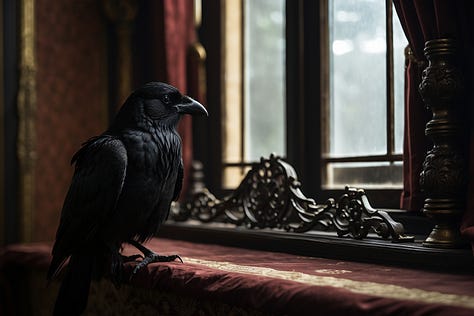As Darje approached the welcoming visage of the Nyingma monastery, his eyes fixed upon its ancient walls as if seeing them for the first time, a weighty reflection began to ripple through the layers of his memory. Could it be that he was now a stranger to his own past? With an uncanny sense of detachment, he found himself journeying through the labyrinthine corridors of his thoughts, back to a time shrouded in the mists of trial and tribulation, an age both remote and everlastingly present.
Sixty days and sixty nights he had spent in the savage, snow-veiled wilderness of Bod's towering, majestic mountains—a ferocious landscape that churned the heavens with fury and roared through the valleys like an otherworldly beast. Here, the cold was a sentient entity, malevolent and unyielding; it gnawed at the marrow of one's bones, seeped through the soul's defenses like a ghost passing through walls. This frigid crucible had the divine duality of both making and unmaking warriors; it could either forge unbreakable spirits or shatter dreams into glacial shards.
Emerging from this frosty hellscape was Darje, not merely a monk but a veritable sentinel of resolute will. A monument of determination, chiseled from sinew and discipline, stood defiant against the elements. His physique, once youthful and untested, now bore the stigmata of countless battles against nature and himself—abrasions and bruises like constellations charting his passage through trials. Despite these scars, his spirit soared, eagle-like, above the trivialities of flesh and blood.
Now, he was almost there, so close to the sanctuary that he could taste its austere tranquility. Through a screen of swirling snowflakes, he glimpsed the twinkling lights of the Kagyu monastery, which stood in stark contrast to the barren expanses around it—a solitary star in a celestial sea of whiteness. Draped across his shoulders was the freshly skinned pelt of a young snow leopard, a formidable predator he had defeated in single combat. This pelt was not merely a protective mantle; it was a symbol, a woven tapestry chronicling the tale of survival and triumph.
Likewise, fastened around his waist was the heirloom knife his mother had bequeathed to him, its blade carrying generations of familial courage and ingenuity. The knife was as much a part of him as the tattered, frost-hardened robes clinging to his form—each a sodden, weighty testament to an ordeal that had sought to break him yet only managed to temper his will.
"Where are they? Shouldn't they be here to welcome me?" Darje ruminated as he approached the towering gate that guarded the sacred enclave of monastic life. The wooden arch stood as though a sentient guardian, its timbers soaked in centuries of prayer and contemplation. But something was amiss; an unsettling quietude settled over the compound, wrapping the buildings in a shroud of unnerving stillness.
Stepping cautiously onto the hallowed grounds, his keen senses on high alert, Darje scanned the shadow-strewn courtyard and the monastery's hushed edifices. He tread softly, yet purposefully, knife unsheathed, toward the main hall from whence a flicker of light beckoned like the pulse of some ethereal heart. A sudden movement caught the corner of his eye. With lightning reflexes, his knife descended in a swift, lethal arc, severing the canvas of a nearby tent. A startled mountain cat fled into the darkness, its retreating eyes shimmering with the luminous mystery of the unfathomable heights.
It had been a hard-won lesson of his time in the wilderness: Trust nothing, question everything. Darje knew he had confronted more than mere physical elements; he had waged war on existential demons that gnawed at the foundations of his soul. Yet, even as the physical world threatened to consume him, something indefinable, a spiritual specter or perhaps an epiphany, had visited him. It was a clarity that seemed ephemeral as his weary mind returned to the realm of the ordinary, a clarity that now sang in a mournful chorus with the haunting ache of his isolation and fatigue.
With resolute steps, Darje approached the monastery's grand, time-worn doors. Every fiber of his being tingled with an odd concoction of trepidation and exhilaration. What, or who, awaited him on the other side? Would he find solace or further trials? With a yell that seemed to reverberate through the corridors of his past, present, and future, he threw open the doors, sending a seismic shockwave through the thick atmosphere of the chamber. There, seated in a vast circle, were the monks of his sanctuary, their faces reflecting a still pond of wisdom.
"Welcome home, Darje," intoned Abbot Tenzin, his voice flowing like a mountain stream, flavored with the ageless wisdom of countless past lives.
"Your journey has made you a warrior, but remember—the essence of a monk lies in perpetual learning."
Something profound yet nebulous stirred within Darje, unsettling yet invigorating him. He knew, as he locked eyes with the venerable abbot, that his evolution was incomplete. His heart echoed with the realization that the trial had ended only in the most superficial sense; in truth, he had merely crossed the threshold of a far vaster, more intricate labyrinth of challenges.
Though the mountains had tried him, inculcated him with the primal lore of survival, the real odyssey still awaited. It was an expedition that delved beyond the physical, one that would navigate the soul's treacherous straits and chart the mind's unexplored archipelagos. A voyage not just across the topography of the Earth, but into the geography of his very being.
Thus, as he stood at the intersection of destiny and self-discovery, amid the silence and the sanctity of his brotherhood, Darje discerned a profound truth: the trials were far from over—they were, in essence, only just beginning.
***
As Darje set foot upon the hallowed lands of Nyingma, he was immediately enveloped by an aura of grandiosity that surpassed the boundaries of his humble imagination. Unlike the simple, stone-built quarters of his own ascetic life, Nyingma was a breathtaking tapestry of spiritual and architectural splendor. It was a sprawling, labyrinthine complex where the line between the sacred and the magnificent blurred in seamless harmony.
He gazed up at the towering spires and celestial pagodas that reached toward the heavens as though offering a stairway for gods. Crafted from marble and precious stones that seemed to have captured the very essence of light, these architectural marvels glimmered like celestial bodies in a heavenly firmament. The intricacy of the design—the coiled dragons, the guardian deities, the bas-reliefs recounting ancient epics—each was a reverent nod to a nation's prosperous lineage and a tribute to its storied history.
"Ah, it appears you are struck dumb by our magnificence," the High Abbot remarked, his voice brimming with a palpable sense of pride that seemed to fill the air like incense smoke. "You behold the legacy of a great nation; a prosperous realm blessed by fortune. We are herders of immense flocks, stewards of fertile lands, and our warriors are second to none in valor—shields that guard our sanctity from the scourges of invasion."
As the High Abbot spoke, his voice reverberated across the vast plaza, gaining resonance from the strength and vitality of his people. It felt almost as if the very walls of Nyingma were echoing his sentiments, affirming the truth of a grand civilization.
But even amidst this spectacle of opulence and grandeur, a sinuous tendril of doubt began to coil around the core of Darje's soul. An elusive, unsettling feeling—like the whispering wind that foretells an impending storm—hinted that not all was as it appeared beneath this golden façade.
The High Abbot continued, swelling with the gravity of his office, "You stand in Nyinguo, the crown jewel of our monastic empire. It is home to almost two thousand monks and thrice as many laypeople."
They progressed along the main thoroughfare, a venerable pathway grooved by the passage of countless pilgrims and worn into the permafrost over the span of millennia. On both sides, citizens of Nyingma—some in flowing monastic robes, others in heavy, ornate jackets tailored from exotic furs—lined the route. Their eyes widened in collective awe at the behemoth of a creature being tugged along by the yak and the mysterious monk who accompanied it.
"Intrigued by the scope of our dominion?" the High Abbot asked, noting Darje's incredulous expression.
"Indeed, venerable master. The breadth of your holdings is astounding," Darje replied, his eyes still scanning the horizon, "You speak of other monasteries under your jurisdiction?"
"A multitude," the High Abbot and his accompanying monks responded, their collective laughter tinged with enigmatic undertones, like the sound of a distant bell carried by the wind. "But how, you wonder, do mere monks wield the reins of such an empire?"
"We employ a myriad of means, not all easily swallowed," the monks added, a fleeting shadow darkening their countenances. "But let not your mind be burdened with the intricacies of our governance. Such affairs rest in the sagacious hands of the Sakyanyinguo, our exalted sovereign."
"For a millennium of seasonal cycles," the High Abbot intoned, his voice adopting a hallowed gravitas, "he has been the architect of our destiny. Steering us through epochs of transformation and guiding us to unparalleled prosperity."
As the weight of the High Abbot's words settled over him, Darje felt the enigmatic pulse of Nyingma's heart beating in harmony with the sacred rituals and the unspoken mysteries that permeated its golden air. Yet that subtle disquiet remained, lurking in the recesses of his soul. It whispered that the grandeur before him was but the visible surface of an abyss whose depths held both dazzling light and impenetrable shadow. It was as if the walls themselves—their glittering stones and ancient, whispering timbers—concealed untold stories; stories that would require a seeker of truth to delve much, much deeper.
When Darje entered the monumental edifice that was more akin to a palace than any abode of monks he had ever known, a fanfare of horns and strings erupted in triumphant celebration. The structure towered like a colossus—a gargantuan monument to opulence and authority, so grand that it dwarfed even the formidable walls of the monastery Darje had so recently admired. It stood as a citadel of splendor, making sixty men atop one another appear meager in comparison.
The prodigious doors, sculptures in themselves, etched with scenes of divine beings and intricate patterns that seemed to dance with every flicker of light, parted with a surreal quietness. The smoothness of their movement could only have been achieved through well-greased hinges, a subtlety often overlooked but not in this palace of meticulous excess.
Darje was immediately enveloped in an atmosphere of unrestrained indulgence, a radiant warmth that clashed with the austerity of his monastic life. The grand hall that lay before him was a more magnificent iteration of a familiar architecture. Massive pillars of thick, gnarled wood, polished until they glowed like amber in the firelight, held up the expansive ceiling. Down the center of the hall was an elongated table, an impressive specimen of carpentry, laden with an opulent spread of dishes that sent aromatic waves through the air. A bustling throng of monks and courtiers filled the space, their exuberant voices weaving an intricate tapestry of jubilation and camaraderie.
Seated at the farthest end of this monumental table was a figure whose attire was a cacophony of vibrant colors and exotic textiles, shimmering with jewels that caught and amplified the flickering light—a man who could only be Sakyanyinguo, the enigmatic ruler of this grand empire. Even at a distance, his visage radiated an incandescent charisma, his eyes twinkling with the mischief and allure often reserved for a younger man. Instantly, Darje felt an inexplicable aversion to him; he was a man who, it seemed, had never felt the harsh breath of the mountain winds, nor had ever faced the perils of nature's untamed wrath.
With a grandiose sweep of his robed arm, Sakyanyinguo rose to his feet, his face animated by a radiant smile. His voice, imbued with a gravitas that seemed capable of summoning the heavens, reverberated against the wooden walls as he declared, “My esteemed guests, behold! The young monk who stands before us is the very slayer of the fearsome Gyalwa!”
A heavy silence fell upon the hall, broken only by the audible gasps and whispers that swept through the crowd like a sudden gust of wind. All eyes pivoted toward Darje, fixing him in a spotlight of intense scrutiny and awe. It was a moment in which he felt both honored and peculiarly vulnerable.
Sakyanyinguo made his way toward Darje, his voluminous robes trailing behind him like the train of a comet, their hems just skimming the surface of the polished floor. “An extraordinary achievement, indeed. Come, my young hero, a feast of such magnificence has been laid out in your honor.”
As he drew near, Sakyanyinguo extended his arm to clasp Darje’s. Darje hesitated, an instinctual resistance tightening his muscles. Then, gently extricating himself from the ruler's grip, he chose a seat that was decidedly distanced from the head of the table.
Sakyanyinguo looked at him quizzically, his eyes narrowing ever so slightly, a smirk of bemusement playing at the corners of his mouth. "What's the meaning of this choice, young monk?"
Darje met his gaze firmly. "I wish to sit here, amongst my fellow brethren, not elevated above them."
For a moment, an inscrutable expression flitted across Sakyanyinguo’s face, but it was quickly replaced by a laughter that resonated throughout the hall—a laughter rich and textured, yet somehow lacking in genuine mirth. "Ah, very well, very well," he chuckled, sweeping his eyes across the room as though sharing an intimate joke with the entirety of his court. "If that is your wish, then so be it. You shall dine among the many, not the few."
Though his smile was wide and his demeanor welcoming, Darje couldn't help but notice that the warmth didn't extend to the ruler's eyes, which remained cold, calculating—mirroring a universe of unspoken truths and veiled intentions.
A banquet unfurled before Darje that defied the scope of any gastronomic experience he had ever known. The vast hall, already a landscape of majestic architecture and vibrant personalities, metamorphosed into a theater of culinary magnificence. Platters, each one a small universe of colors, textures, and flavors, were paraded onto the elongated table. Exotic fruits from lands Darje had only heard tales of, meats seasoned with spices that tickled his senses in unfamiliar ways, and pastries that seemed spun from sugar, light, and air itself, took their positions on the expansive table.
Every morsel seemed a work of art, embodying both taste and aesthetic in equal measure. The tableware further magnified the aura of regality; porcelain dishes elegantly adorned with intricate patterns of gold and azure, and utensils of finely wrought silver, carved with delicate motifs. Yet, amidst the opulence, Darje felt an overwhelming sense of detachment. The porcelain, the silver, the decadence—they all seemed so incongruent with the rugged beauty of the mountains, the austere simplicity of his hermitage.
The sensory extravaganza did not stop at mere taste and sight. Each bite he took seemed to explode with flavors, overwhelming his taste buds with an arsenal of sensations—spicy, sweet, tangy, umami—all vying for his attention. The fragrances that filled the air were an olfactory ballet, a swirling dance of scents that romanced his nostrils. And yet, even as he tasted and smelled, Darje could not shake the unsettling feeling that he was but a foreign entity in this realm—a specimen under scrutiny, a curiosity to be marveled at but never truly understood.
And then commenced the speeches, an oratorical tapestry woven with threads of gold and silver words, phrases that soared and dipped with the cadence of practiced eloquence. Figures of note stood, their voices filling the hall with grandiose visions of unity, prosperity, and celestial harmony. Each sentence was a finely crafted gem, each utterance a monument to the collective ethos of the nation. But to Darje, the language of grandiosity sounded empty, bereft of the pure, unadorned truths that guided his own humble existence. For every lofty ideal extolled, he sensed an unspoken compromise, an unacknowledged sacrifice—feelings he could not dismiss, despite the sumptuous banquet that continued to unfold before him.
With a sense of relief that felt like a betrayal, Darje finally took his leave, retiring to quarters that were a sanctuary of silk and tapestry. The sheets beneath him felt impossibly soft, almost cloud-like in their texture, yet strangely alien. As he lay there, his gaze ascended to the vaulted ceiling, a canvas of embroidered mythology, golden threads forming constellations of ancient heroes and celestial beings. But his thoughts were occupied by a very different set of eyes, eyes that belonged to neither gods nor heroes.
As he sought the elusive comfort of sleep, his mind’s eye was haunted by the piercing gaze of Sakyanyinguo—eyes that were cold, probing, and unsettlingly analytical. These were not the eyes of wisdom Darje had naively expected to find in the ruler of such a grand empire. They were eyes that weighed and measured, seeing much yet revealing little. And it was this unsettling memory that accompanied Darje into a restless slumber, a fitful sleep where opulence and austerity clashed in a labyrinth of dreams, as he yearned for the grounding reality of his simple, mountainous abode.
***
As the silver tendrils of moonlight crept through the silk drapes of his chamber, Darje tossed restlessly on his luxurious bed. A guttural sense of unease knotted his stomach, as if a prophetic dread had settled upon him. Somewhere between slumber and wakefulness, he heard it—the calling of a crow, sharp and discordant, jolting him to full alertness.
His eyes snapped open just as the dark silhouette of an assassin materialized from the shadows, a dagger glinting ominously. In a single fluid motion, Darje rolled off the bed, narrowly dodging the lethal blade that thudded into the place where his head had rested mere moments before. Barefoot, he hit the floor and was instantly on his feet, his hands finding the hilt of his own weapon—a sword gifted to him by his master, its blade etched with ancient Tibetan runes.
Clad in black robes that seemed to swallow the light, a second assassin appeared, lunging at him with a serrated dagger. Darje sidestepped, his blade swinging out like a crescent moon, intercepting the attack and sending sparks flying. Then he pirouetted, his sword trailing an arc of silvery light as it found its mark, cutting through cloth, flesh, and bone.
In that sacred, terrifying moment, Darje transformed. His countenance became an icon of wrathful justice, a living thangka framed by the eerie shadows and the flickering moonlight. His sword, an extension of his will, moved as if guided by deities from the pantheon of Tibetan myth—each stroke a symbol, each parry a prayer, each lunge an offering. He was a wrathful deity given form, his dance a mudra of violence and liberation.
The third and fourth assassins bounded from the alcove, armed with katars and poised to strike. But Darje, drawing upon a wellspring of inner focus, met their frenzied attacks with a deadly, almost divine, precision. His blade found its home in the soft spaces between armor and flesh, shearing through sinew and ending lives that had strayed from the path of righteousness.
With a final, deafening war cry that seemed to echo off the distant Himalayan peaks, Darje delivered the concluding blows. The lifeless bodies of his assailants crumpled to the ground, their malignant intent extinguished by the unwavering blaze of his righteous fury.
His chest heaving, awash in both moonlight and the eerie tranquility that follows battle, Darje climbed the stone steps leading to the monastery's towering wall. Tibetan prayer flags fluttered in the chill night air, sending their blessings and mantras on the wind as if to sanctify the field of combat he had just left behind.
From his elevated vantage point, Darje's eyes fell upon the labyrinthine sprawl of the city of Nyinguo. Its palaces and pagodas, which had once seemed the epitome of magnificence, now betrayed their darker truth. Under the facade of opulence lay a rotting core, a heart of treachery and malevolence. The very walls that stood as a testament to human ingenuity and devotion were now tainted monuments to a society founded on exploitation and spiritual emptiness.
As he stood there, his silhouette framed by the towering spires and fluttering prayer flags, Darje became a solitary figure of resolve and revelation. His eyes glinted with newfound wisdom and a resolve that could not be shattered—a living symbol of the eternal struggle between light and darkness, purity and corruption, compassion and cruelty.
He realized that he had come face-to-face with a challenge more formidable than any mountain beast or natural peril—a challenge that struck at the very heart of his beliefs, questioning the nature of righteousness in a world fraught with moral complexities. And as the first rays of dawn began to climb the eastern sky, mingling with the dissipating moonlight, Darje knew that his true quest had only just begun.
As the intoxicating haze of battle-lust gradually dissipated from his veins, Darje found it replaced by an overwhelming sorrow, as heavy as the Himalayan snows that blanketed the rugged landscape. The fierce joy of victory was now tinged with an unsettling realization—he had witnessed the appalling depths to which humanity could plummet in its insatiable quest for dominion and wealth.
The visages of his fallen adversaries haunted him, emerging from the murkiness of his mind, not as nameless foes dispatched in the throes of combat, but as souls led astray. Each was a tragic figure, waylaid upon a crooked path by a perverse philosophy that venerated power at the expense of compassion, that elevated the self over the collective soul of mankind.
Slowly, with the solemnity of one attending a ritual, Darje descended the towering wall. Its stones, which had once seemed to resonate with a majestic grandeur, now appeared as bleak as the deception that underlay the city's splendor. He treaded lightly, exiting through a secret gate known only to the monastery’s oldest initiates, and vanished into the frozen expanse beyond.
The air was a dagger of ice against his skin, as if the very elements sought to challenge his resolve. Yet, the biting cold was a benediction, a tangible sensation that reconnected him with the immediacy of life, away from the murky complexities of political intrigue and moral compromise.
As he ventured further into the inhospitable wilderness, Darje's thoughts returned to his own kin, the humble Kagyu monks of his secluded monastery. How, he pondered, had they remained invulnerable to the malevolent tendrils of corruption that seemed to coil around the heart of the world itself? Was it their unwavering adherence to their vows, their ascetic lifestyles that emphasized mindfulness and equanimity? Or was it perhaps something even more ineffable—a kind of transcendental wisdom rooted in an understanding of the eternal truths that lay beyond the ephemeral flicker of mortal existence?
Day followed relentless day, and still, Darje moved resolutely toward his homeland. Each obstacle the land threw his way—whether blizzard or precipice—was met with unwavering resolve; they were but momentary trials in a journey of existential import. His body was weary, but his spirit soared, sustained by the clarity of his mission. He understood now that he bore a message of dire urgency: a warning that he must deliver to his people about the lurking malignance that sought to engulf even the last sanctuaries of purity.
Driven by an imperative that was at once deeply personal and universally profound, Darje quickened his pace. Snow-capped peaks loomed ever closer, each a solemn sentinel that marked the border of his cherished homeland. His heart pounded with the rhythm of a drumbeat, calling him to a purpose that was now as clear as the azure sky that stretched infinitely above.
Upon crossing that unseen line back into the lands of his birth, Darje knew that he was on the brink of a pivotal moment, not just in his own life, but in the history of his people, and perhaps, in the endless struggle between the sacred and the profane that defined the human condition. The lessons gleaned from the shadows of Nyingma would not merely be his own; they were revelations to be shared, harbingers of a challenge that his Kagyu brethren would have to face, if not today, then surely someday hence. And so, fortified by a newfound understanding of the fragility of virtue in a world teetering on the brink, Darje steeled himself for the arduous task that lay ahead—to illuminate the path for others, even as he sought to navigate his own way through the labyrinthine complexities of a universe in flux.
Upon his return, he was hailed as a hero, the humble Kagyu monk who had slain the great Gyalwa and unearthed the hidden truths. But Darje's eyes were haunted, and those who looked into them could see that he had lost something of himself in the process.
He recounted his tale to the elders of Kagyu, his voice filled with passion and sorrow. He spoke of intrigue, deception, dark secrets, and a once-great nation that had fallen from grace. He spoke of a melody that had moved him, a song that had sprung from his lips as if guided by some divine hand. He spoke of a king who had betrayed him, and a battle that had raged within his very soul.
The elders listened in silence, their faces etched with concern and understanding. They knew that Darje's journey had changed him, had shown him the complex tapestry of human nature, both its beauty and its ugliness. They knew that he had witnessed firsthand the delicate balance that existed between light and darkness, between honor and treachery.
In the end, they praised him for his courage and his wisdom, but they also recognized that he needed time to heal, to find his way back to the peaceful monk he had once been. They offered him a place of solace within their monastery, a sanctuary where he could meditate and reflect on his experiences.
Darje accepted their offer with gratitude, knowing that he had found a home among his people, a place where he could seek answers to the questions that still lingered in his mind.
And so, the humble Kagyu monk who had once ventured out into the world, filled with youthful bravado and a thirst for adventure, returned to the quiet halls of his monastery, a man tempered by experience, forged by conflict, and forever changed by the events that had unfolded.
But the secrets he had uncovered would not be forgotten. They would resonate through the annals of history, a stark reminder of the fragility of human morality and the eternal struggle between right and wrong. They would serve as a cautionary tale, a warning to future generations of the dangers of unchecked ambition and the corrosive power of greed.
In the tranquil alcove of his sanctuary, where the ancient tapestries of Vajrayana Buddhism cast shadowy vignettes onto walls inscribed with sacred mantras, Darje found himself enveloped in a moment of ethereal solitude. Each inhalation brought the aromatic waft of juniper incense and butter lamps, awakening his senses as though inviting them into a celestial realm. And in this blessed solitude, his soul once more danced to the melody that had sprung from its depths—a song woven of valor, loss, and ultimate redemption.
As he hummed its mystical tune, the intimate chamber seemed to reverberate, as though echoing the very pulse of the universe. Darje felt as if the wisdom of the lineage masters, immortalized in the thangkas and scriptures around him, was merging with his own consciousness. It was as if the essence of Milarepa, Padmasambhava, and countless other Kagyu saints were harmonizing with his melody, together orchestrating a symphony of cosmic enlightenment.
The melody—the enigmatic song of his soul—was his leitmotif; it encapsulated all that he had experienced. It was a fusion of paradoxes, of love and betrayal, of spiritual elevation and worldly disillusionment. Yet it was also a testament to the grandeur of the human spirit, to its unbreakable will to transcend the labyrinth of earthly complications and ascend towards the realm of the divine.
In the unfolding days and weeks that followed, events swirling with undercurrents of subterfuge and startling revelations would ripple through the fabric of Nyingma and even the broader Tibetan plateau. These tumultuous happenings laid bare the incongruities of human character—its capacity to scale the lofty peaks of virtue, yet also to plummet into the abysses of moral decay.
Yet Darje's odyssey, veined with its own complexities and moral ambiguities, had led him not only to an unmasking of external realities but also to a sublime understanding of his own inner cosmos. It was the journey of a man who had navigated through the murkiness of human existence to discover his Dharma, his cosmic law and order. More importantly, he had gleaned the profoundest of life's lessons—that within the pitch-black caverns of our darkest moments, there flickers an eternal flame of hope, an undying ember of shared humanity that, if nurtured, can illuminate our path towards a better destiny.
And thus, the saga of Darje, the Kagyu monk with eyes that had peered into both celestial and abyssal dimensions, would become a lore of its own. Transcribed onto palm leaves, sung in nomadic firesides, and depicted in colorful thangkas, his legend would awaken the spirit of inquisitiveness in others, motivating myriad souls to embark upon their own quests for wisdom and enlightenment.
In a world caught in the perpetual whirlpool of impermanence, they would find in Darje’s epic tale an eternal clarion call—a beckoning to rise, to ascend, to metamorphose. His story, both an end and a beginning, would remain a radiant cornerstone in the ever-unfolding scroll of human and cosmic history, its echo reverberating across the Himalayas and beyond, forever inviting each individual to explore the boundless landscapes of their own soul, to seek their own unspoken truth, and to find their own divine melody in the cacophonous symphony of existence.
The story continues here.
